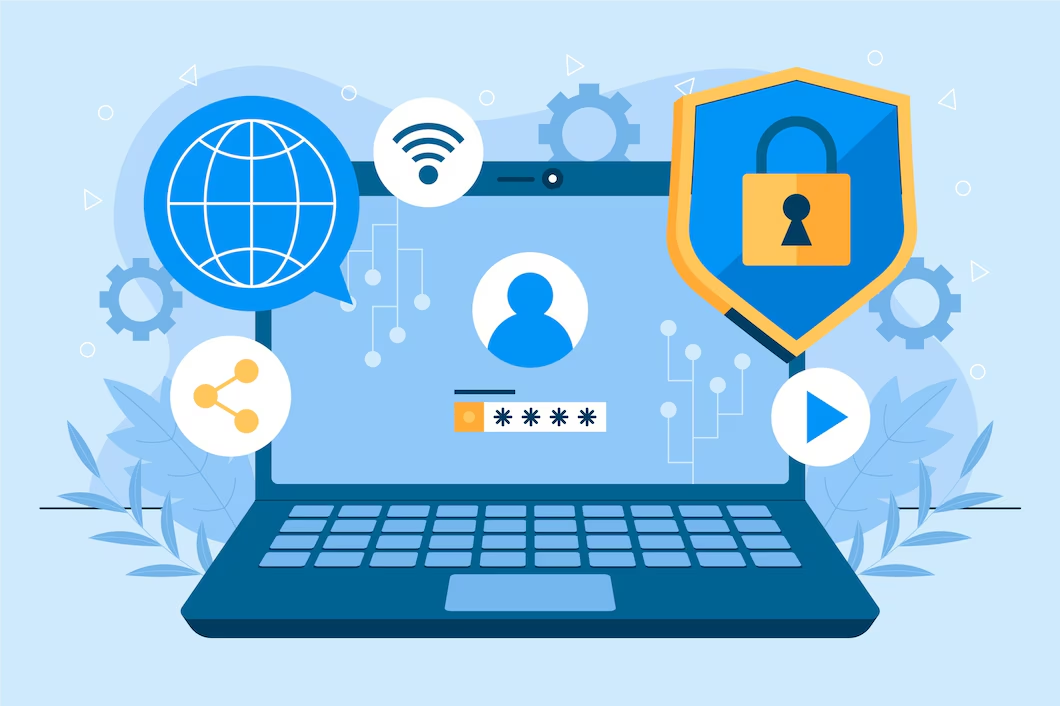Boost Your E-Commerce Business with Reliable Office Internet
-
January 23, 2025
-
8 min read

How does optimising the internet for ecommerce business impact your bottom line? In the digital marketplace, latency and packet loss represent not just inconveniences, but potential revenue dips. A robust network infrastructure underpins successful e-commerce operations, where milliseconds of delay can equate to significant customer attrition rates.
By scrutinising network protocols and bandwidth requirements, businesses can discern the precise specifications necessary to handle peak load transactions.
Let us get into how strategic internet enhancements can catalyse operational efficiency and drive substantial growth in your e-commerce business.
Basics of Office Internet for E-Commerce
Reliable internet for ecommerce business is essential. It ensures smooth operations and customer satisfaction.
Types Of Internet Connections Suitable For E-Commerce Businesses:
- Fibre Optic Connections: These provide top speeds and reliability, crucial for handling heavy web traffic and supporting real-time transactions. Fibre optics transmit data incredibly fast, ensuring quick page loads and efficient customer service.
- Cable Internet: Popular for its speed and widespread availability, cable internet supports robust e-commerce activities. It offers significant bandwidth, allowing for smooth handling of sales and customer interactions. However, speeds may decrease during high-traffic periods.
- DSL (Digital Subscriber Line): This uses traditional phone lines and is more suitable for smaller e-commerce sites. DSL is generally more affordable but offers slower speeds, which might be sufficient for businesses with lower customer traffic.
- Satellite Internet: Ideal for locations without cable or fibre options, satellite internet reaches most remote areas. While it covers wide areas, its slower speeds and higher latency can be challenging for dynamic e-commerce needs.
Moreover, to make the most informed decision for your e-commerce operations, considering the differences between ethernet over copper vs fibre internet is essential, as both technologies cater to varying business needs and scale.
The Impact of Internet Speed and Stability on E-Commerce
Fast and stable internet is vital for every online business. It directly affects sales and customer satisfaction.
How Internet Speed Affects Website Performance and Customer Experience?
- Page Load Time: Quick page loads keep customers engaged. If a website takes more than a few seconds to load, potential buyers may leave, possibly to a competitor’s site. Fast internet for ecommerce business ensures that images, videos, and product descriptions load swiftly, enhancing user experience.
- Bounce Rates: Speed influences bounce rates. Websites that load quickly tend to have lower bounce rates. This means more customers stay on the site, increasing the chances of making purchases.
- SEO Ranking: Search engines favour websites that load quickly. Faster sites rank higher, which boosts visibility and drives more organic traffic.
- Conversion Rates: Speed improves conversion rates. A smooth, quick checkout process encourages customers to complete purchases without frustration.
The Role of Stable Connectivity in Maintaining Online Transactions
- Transaction Integrity: Stable internet ensures that transactions process correctly without errors or timeouts. This reliability is crucial during payment, as disruptions can lead to failed transactions and lost sales.
- Customer Trust: Consistent connectivity builds trust. Customers expect a reliable shopping experience; frequent site outages or slow loading times can harm your brand’s reputation and deter future purchases.
- Real-Time Updates: E-commerce relies on real-time data for inventory and pricing updates. Stable internet supports these updates, ensuring that the information displayed is accurate and current.
- Support Services: Live support and chat services require uninterrupted internet to function effectively. These services help resolve issues quickly, improving customer service and satisfaction.
Choosing the Right Internet Service Provider (ISP)
Selecting an ISP is crucial for ensuring your e-commerce platform operates efficiently.
Factors to Consider When Selecting an ISP for E-Commerce
- Speed and Bandwidth: Choose an ISP that offers high-speed internet capable of handling your website’s traffic without slowdowns. More bandwidth supports simultaneous transactions and heavy data usage without lag.
- Reliability: Look for providers known for consistent and dependable service. Downtime can directly impact sales, so a reliable connection is critical.
- Customer Support: Excellent customer service is essential. Your ISP should offer 24/7 support to quickly resolve any issues that could affect your business operations.
- Scalability: As your business grows, your internet needs will change. Your ISP should allow you to easily upgrade your service as needed.
- Security Features: With cyber threats on the rise, ensure the ISP provides robust security measures to protect your data and your customers’ information.
- Cost: While not the only factor, pricing is important. Compare costs against the services and features offered to find the best value for your internet for ecommerce business.
For businesses seeking a reliable ISP, Airtel Office Internet is an excellent choice. It offers high-speed plans tailored for e-commerce, ensuring seamless website performance and customer satisfaction. With superior uptime backed by SLAs, Airtel minimises downtime risks and ensures consistent operations. Their 24/7 customer support swiftly resolves issues, providing uninterrupted service.
Airtel also prioritises security with features like Google Workspace and free antivirus tools. Competitive pricing and scalable plans make it ideal for businesses of all sizes, supporting growth while maintaining exceptional service quality.
Comparison of Top ISPs Offering Reliable Business Internet Plans
- ISP A: Known for ultra-fast fibre optic connections and excellent customer service. Ideal for large e-commerce sites requiring high bandwidth.
- ISP B: Offers competitive pricing with flexible corporate postpaid plans, suitable for small to medium-sized businesses. Known for reliable uptime statistics.
- ISP C: Focuses on security with advanced cybersecurity features included in their packages. They offer good speeds and are recommended for businesses that handle sensitive customer data.
- ISP D: Provides extensive coverage, including in remote areas, with options for satellite internet. This is a good choice for businesses outside of typical urban service areas.
- ISP E: Known for their scalable solutions that grow with your business. They provide tailored services that can adjust as your traffic increases.
Advanced Internet Features for Enhancing E-Commerce Operations
Advanced features in internet services play a crucial role in boosting e-commerce efficiency and reliability.
Importance of Uptime Guarantees and Customer Support
- Minimised Downtime: Uptime guarantees ensure your website remains operational round the clock. Even a few minutes of downtime can lead to revenue loss and damage customer trust.
- Increased Reliability: A high uptime percentage reflects the stability of your connection. This helps maintain smooth operations during peak traffic periods.
- 24/7 Support: Reliable customer support resolves issues quickly. This reduces interruptions and ensures seamless user experiences for customers.
- Proactive Monitoring: Many providers offer proactive network monitoring. This helps detect and fix potential issues before they affect your operations.
Benefits of Dedicated Business Internet Lines
- Exclusive Bandwidth: Dedicated lines allocate the entire bandwidth to your business. This prevents speed drops caused by shared connections.
- Consistent Speeds: With no sharing, your business enjoys stable upload and download speeds. This is vital for handling large volumes of data and real-time transactions.
- Enhanced Security: Dedicated lines reduce risks associated with shared networks. They provide an added layer of protection for sensitive business data.
- Customisation: Providers often customise dedicated internet plans to suit specific needs. This flexibility supports scalability as your business grows.
Incorporating these advanced features into your internet for ecommerce business setup ensures operational stability, better performance, and improved security. This translates into greater customer satisfaction and long-term success.
Security Considerations
Secure internet connections are critical for protecting customer data in e-commerce. They ensure trust and compliance with data protection regulations.
The Need for Secure Internet Connections to Protect Customer Data
- Data Encryption: Secure connections use encryption to protect sensitive information. This prevents hackers from accessing customer payment details and personal data.
- Firewall Protection: A robust firewall blocks unauthorised access to your network. It creates a barrier between your systems and potential threats.
- Secure Payment Gateways: Secure internet supports safe transaction processing. This reduces the risk of data breaches during online payments.
- Compliance Standards: Using a secure internet for ecommerce business helps you meet industry standards like PCI DSS. This ensures legal compliance and builds customer confidence.
Best Practices for Cybersecurity With a Focus on Internet Infrastructure
- Use VPNs: A Virtual Private Network (VPN) adds an extra layer of security. It protects data transfers between your business and customers.
- Regular Updates: Keep your network software and hardware updated. Updates fix vulnerabilities that hackers can exploit.
- Multi-Factor Authentication (MFA): MFA adds another step for user verification. It ensures only authorised personnel can access critical systems.
- Monitor Traffic: Continuous monitoring identifies unusual activity on your network. Early detection allows quick action to prevent breaches.
- Employee Training: Educate employees on safe internet practices. This reduces the risk of accidental security lapses.
Secure internet connections and strong cybersecurity practices are essential for protecting your e-commerce platform. These measures help safeguard your operations and ensure a safe customer experience.
Final Thoughts on E-Commerce Connectivity
In conclusion, a reliable and secure internet for ecommerce business is vital for smooth operations, customer satisfaction, and data protection. High-speed connectivity, consistent uptime, and robust cybersecurity measures form the backbone of successful e-commerce platforms.
Investing in advanced internet features and dependable ISPs can enhance both performance and scalability. Airtel Office Internet stands out with its high-speed plans, 24/7 support, and built-in security features, making it a trusted choice for businesses seeking to optimise their online operations and achieve long-term growth.
 Share
Share









